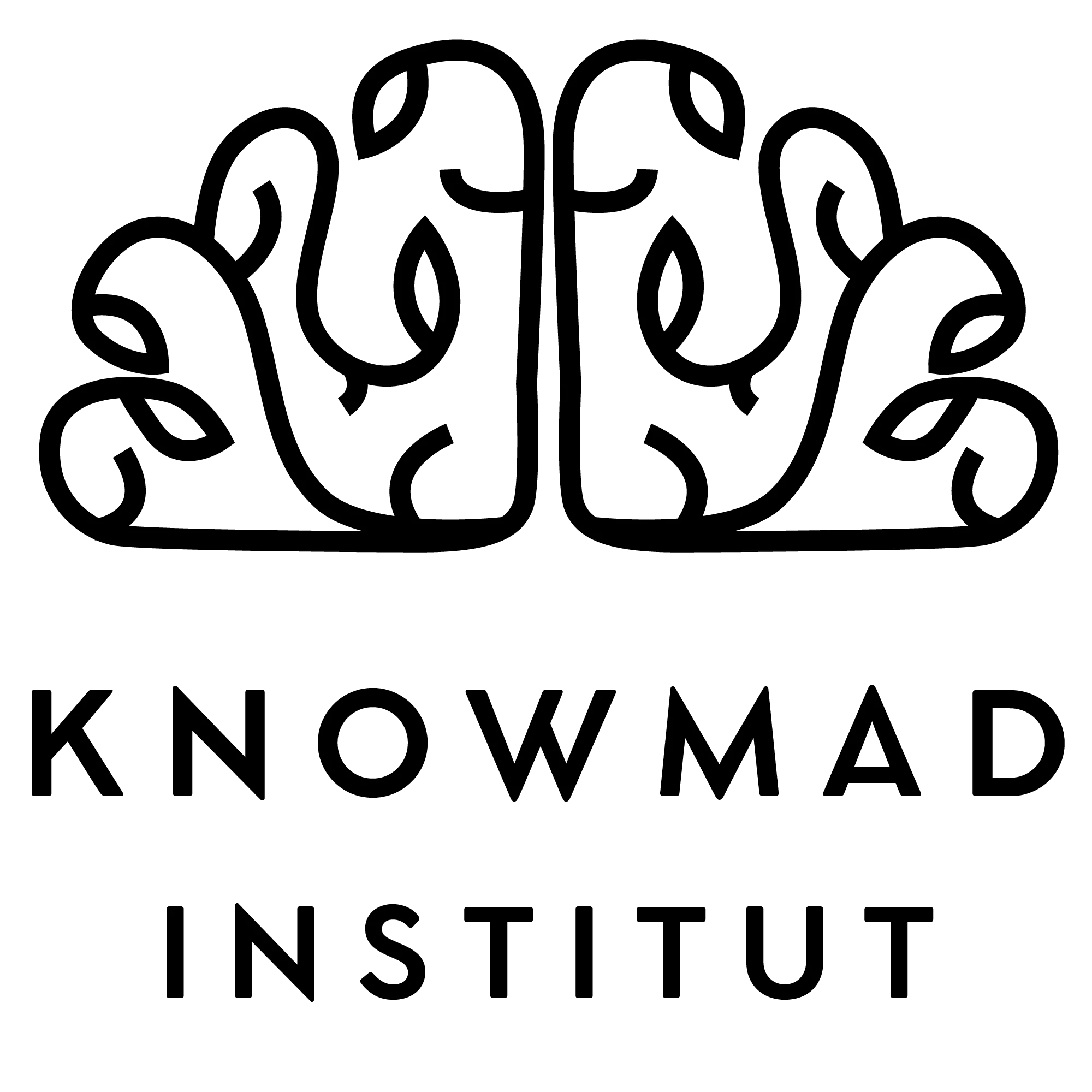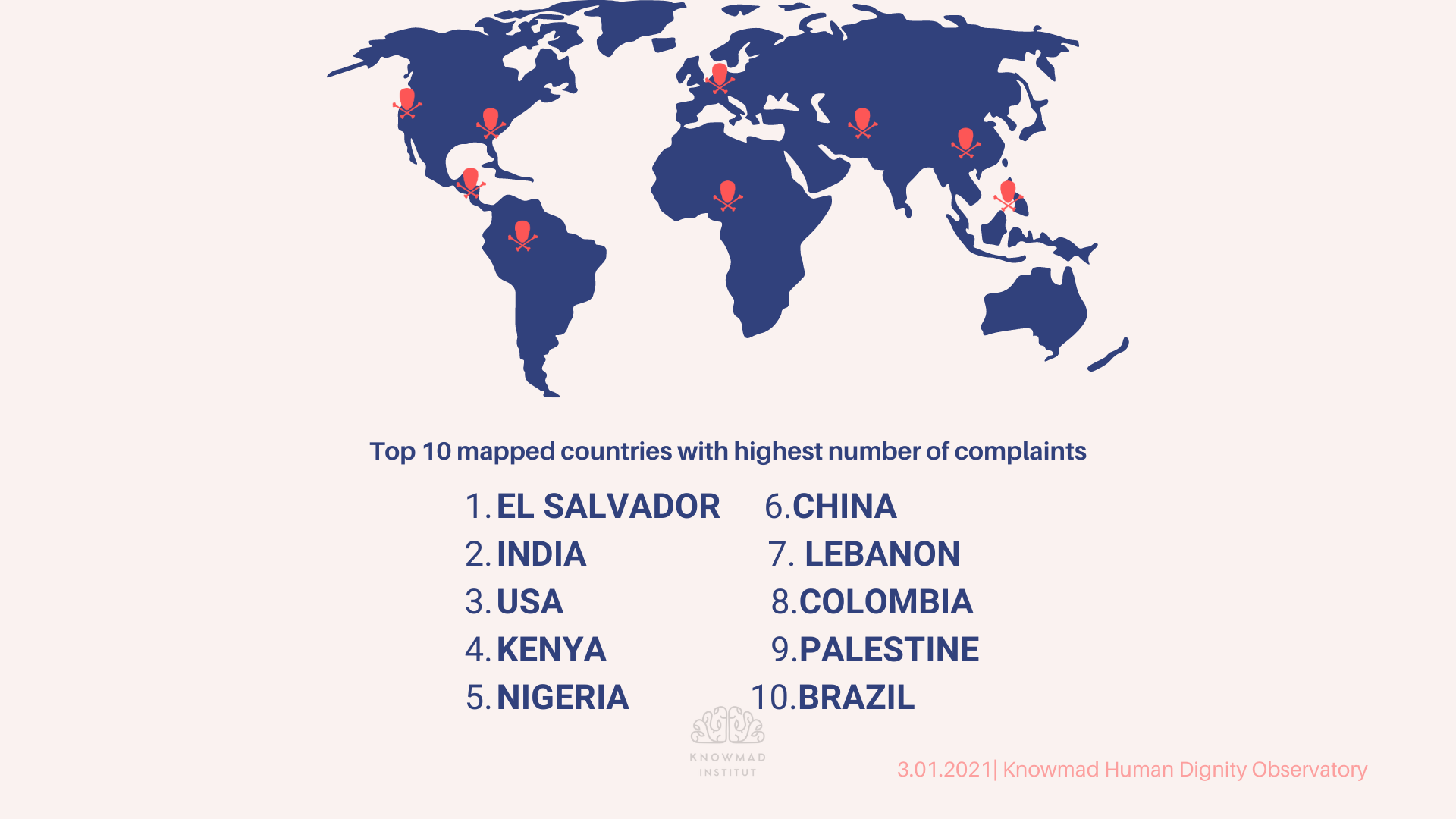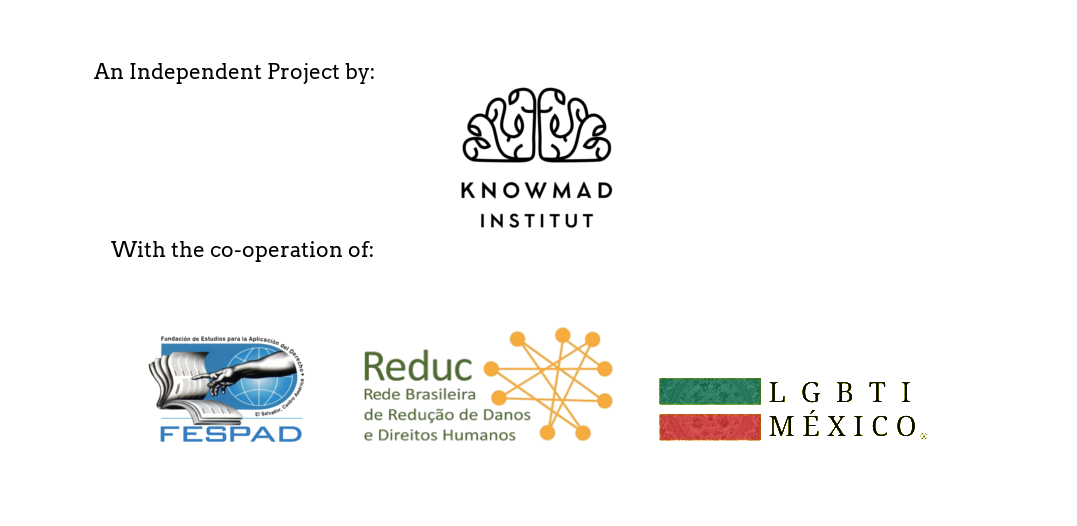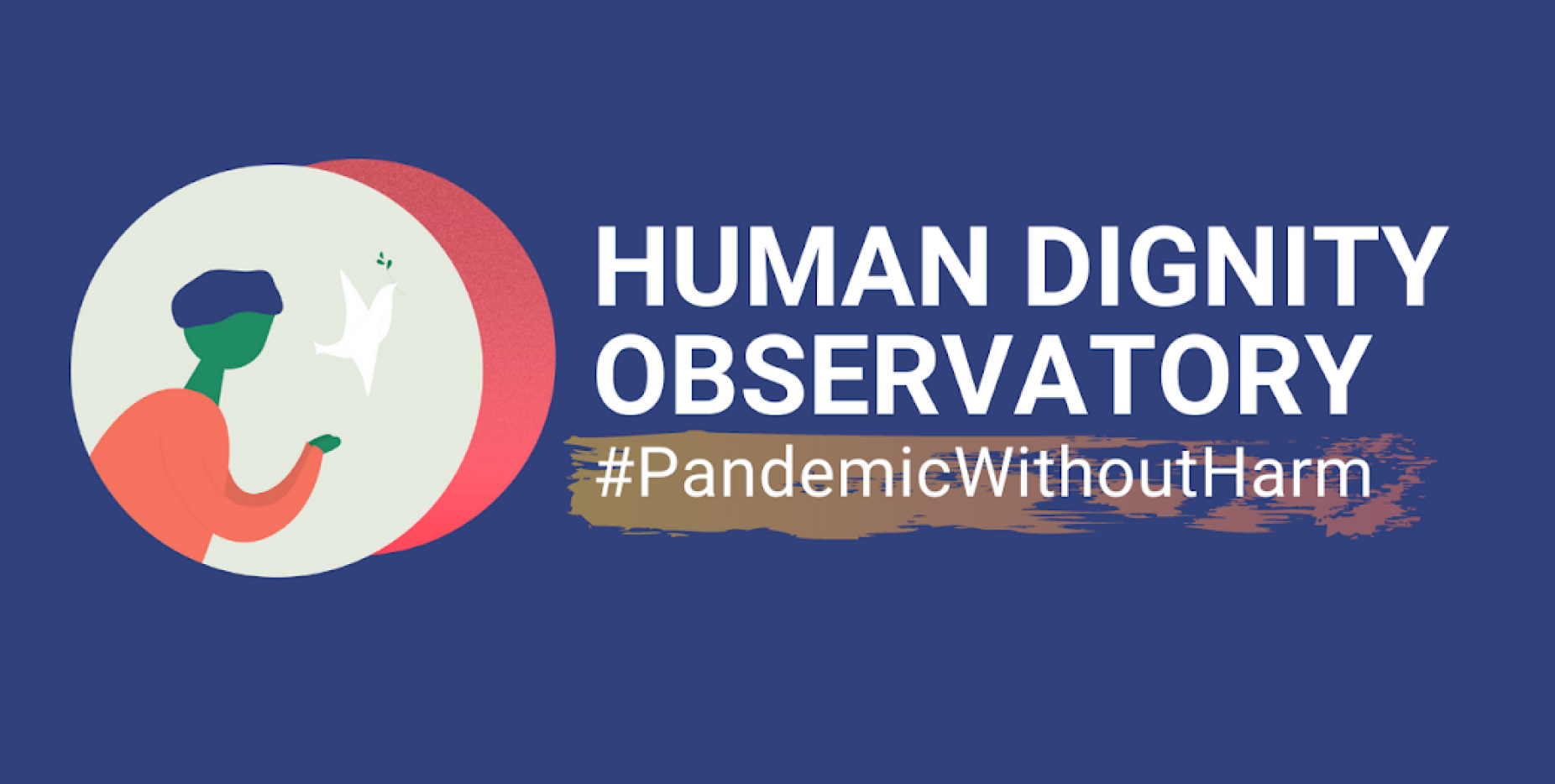Monitoring & Information Center for Human Rights Violations during the Pandemic of COVID-19
An initiative of the Knowmad Institut
In Cooperation With: FESPAD, REDUC and LGBTI-Mexico
Foreword
Social justice, human dignity and sustainability are perceived as the most fundamental values – Freedom, Equality and Fraternity – underlying the Charter of the United Nations.
Undoubtedly, the health emergency due to COVID-19, declared pandemic in March 2020, has been an event that has tested each of the countries, both in their health and emergency systems, as well as in the respect for the Rule of Law and Human Dignity.
The ineffectiveness of governments in enforcing mobility restrictions has brought with it other serious consequences, labor rights are being seriously affected and family economies with them.
It is believed that verifiable data, together with public awareness of the particularly worrying effects of the crisis, will serve as a basis for combating human rights violations.
The objective of this independent observatory is to collect and analyze allegations of human rights violations during the confinement resulting from the COVID-19 pandemic and to prepare a report for submission to the Office of the United Nations High Commissioner for Human Rights, the Global Alliance of National Human Rights Institutions and the Inter-American Commission on Human Rights.
Considering the systematic violations of human rights in the context of the current health crisis, the Knowmad Institut is working with partner organizations and volunteers on a record of violations based on complaints, photographs and videos posted on Twitter.
The problem outlined affects every country in the world. Our research languages are English, German and Spanish.
The Problem & Tools
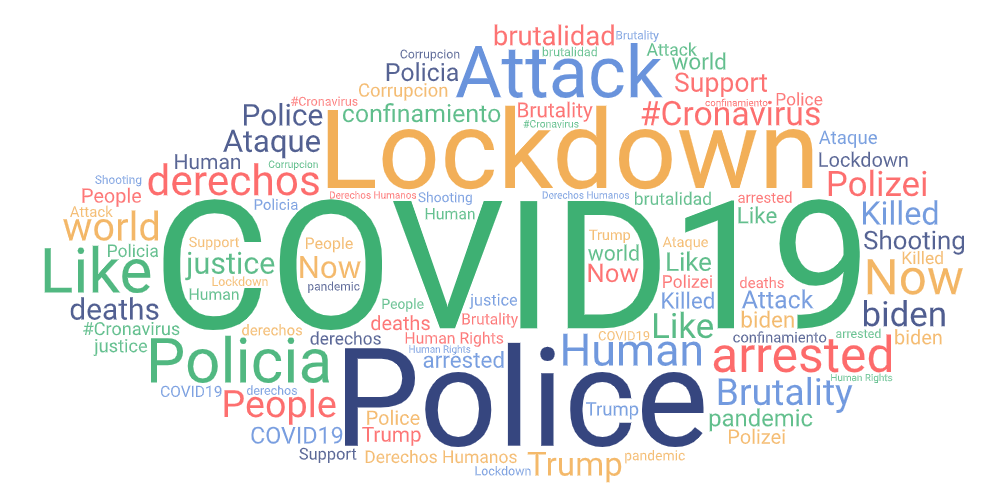
Since the beginning of the COVID-19 pandemic, a steady increase in human rights violations has been reported. These violations include a wide range of cases. They have ranged from acts of domestic violence to violations committed by governments and other public authorities. In addition, human rights violations during the global health crisis can hardly be reported to the authorities because in most cases, it requires victims to physically appear before the relevant agencies.
However, access to these agencies is very limited due to the political measures taken during the crisis and their regulations. Consequently, many of the human rights violations are reported on social media or can be effectively traced there. As a technologically well-versed think tank and action group, we see an important field of work here: verifiable tracking, documentation and reporting of human rights violations, which are reported on social media in general, on the Twitter platform in particular, with the help of blockchain technology and data analytics.
Although since the beginning of the observatory the list of countries with the highest number of complaints did not vary significantly, the difficulty of collecting information from countries with a high level of censorship such as Belarus, Hungary or Iran stands out.
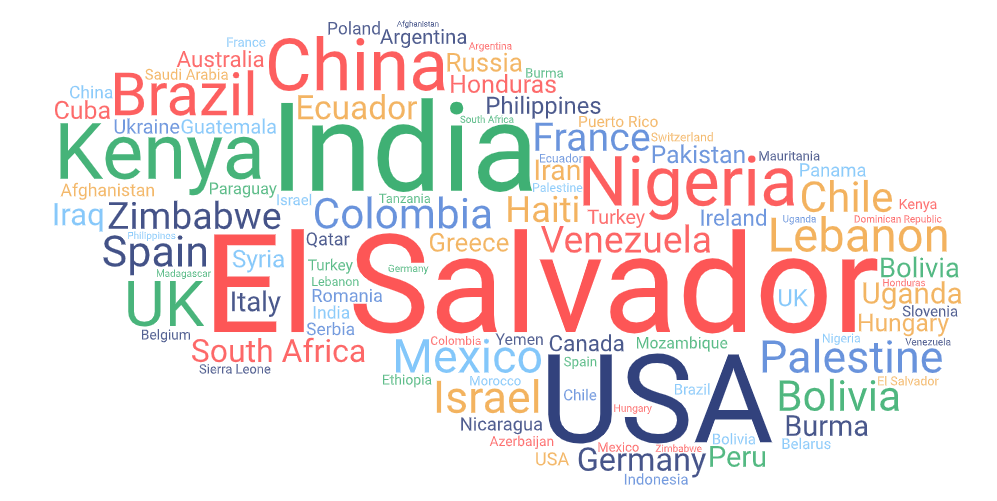
Our project aims to provide tools to take action against human rights violations in the course of emergencies such as the COVID-19 pandemic. We do this by documenting human rights violations reported on Twitter and using blockchain technology to have a timestamp, verifiably documenting relevant media entries and mapping them periodically. In addition to a more general tweet analysis, based on automatic text analysis.
Methodology
Data collection and process development:
- Manual Mapping and Filtering
Advanced search with specific parameters, including time ranges (from March 10, 2020 to November 11, 2020), geolocation, keywords (human rights, brutality, quarantine, COVID-19, violence, police, repression, denunciation, these searches were conducted in Spanish and English).- Screening and review of results
- Data collection + Time stamping
- Analysis and cross-checking of sources to verify facts
- Mapping based on proximity
- Second, verification by coordinator
- Data dump to map (85% completed)
- Third, verification by indexing data on the map (70% completed)
- Report development and presentation
- Data Mining and Text Analysis
- Automatic search with the use of Twitter’s official API making use of specific parameters, including time ranges (from March 10, 2020 to November 11, 2020), geolocation, keywords (human rights, brutality, quarantine, COVID-19, violence, police, repression, denunciation, these searches were performed in Spanish, English and German).
- Sentiment analysis, tweets map, most used words.
Tools used
- Twitter API
- Advanced Twitter search tools
- Open Time Stamp
- Orange
- Google Workspace
- Umap
- DataWrapper
- ACLED Data
- Tvistter
Mapping
WARNING: The following map contains images and videos that can hurt your sensitivity, we recommend caution!
Note: This map is a preliminary version, so it will have constant changes and corrections when necessary.
- Access to the Interactive Map
Help us continue our work, with your support we can deepen and accelerate the mapping of human rights violations during the lockdown measures. GIVE NOW & MAKE GLOBAL IMPACT
Pandemic Impact on Human Rights and Sustainable Development Goals (SDGs)
Restrictions
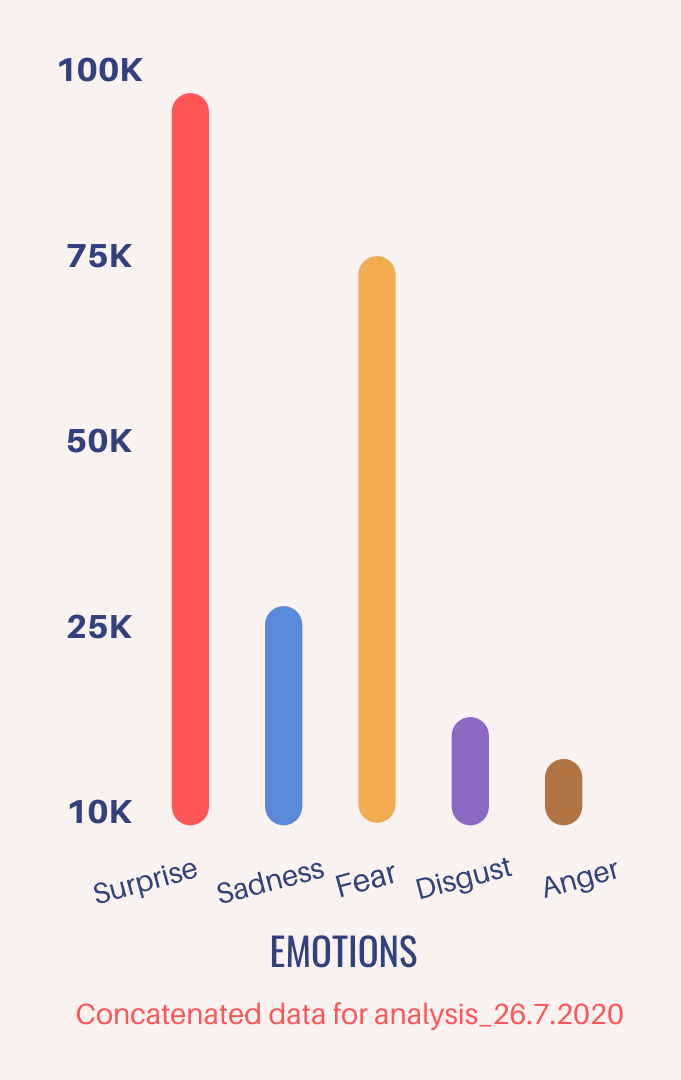
It is necessary to recognize that in the various international instruments there is the figure of “derogation in time of emergency” as indicated in Article 15 of the European Convention on Human Rights, which allows States “in time of war or other public emergency threatening the life of the Nation […] to adopt measures derogating from their obligations…”. This can also be found in similar provisions in the first paragraph of Article 4 of the International Covenant on Civil and Political Rights (ICCPR), in the opening paragraph of Article 27 of the American Convention on Human Rights (ACHR) or in Article 4 of the Arab Charter on Human Rights, to mention a few.
Although these restrictions should be limited according to the guiding principles of the WHO and the fundamental values of the UN, it has been observed how Member States, for the most part, have limited human rights in broader ways, both in scope and duration, in addition to a generalized rise in the abuse of police forces (accompanied by their militarization) and in contrast the desertion of the duty of public security forces in some developed countries.
Findings
The beginning of the decade of action has been intense and has made visible the urgent need to deepen multilateralism in an irreversibly hyperconnected world. Peripheral countries remain the most vulnerable to the direct and collateral effects of the COVID-19 pandemic. This is largely due to two fundamental factors: on the one hand, the lack of commitment by decision-makers to SDG Goal 16 “Peace, justice and strong institutions” and on the other hand, due to the lack of international support to ensure progress towards the SDGs.
However, the cognitive dissonance of the quantitative easing policies with which major central banks have responded to the pandemic contrasts with the growing financial burden faced by peripheral countries with vulnerable economies. All the above makes it unlikely that they will obtain additional support from the international community in the near future, unless creditor countries consider a debt jubilee.
However, the negative impact of the pandemic on food security, environmental protection, access to public health services, freedom of expression and the loss of trust between the authorities and the civilian population in particular stand out. These are clearly strategic priorities of the SDGs.
The most affected SDGs according to our record are goals 161,32,103,84 and 2 5related to justice, rule of law, health, reduction of gaps, decent work and food security respectively.
Corruption, repression and hunger have long been the subject of debate and scrutiny, but never before have they been so visible. Although, it remains to be traced how we will move forward through the current civilizational crisis exacerbated by hunger, COVID-19 and the effects of Quantitative Easing (QE) policies.
Key Observations
Lack of Confidence in Public Security and Healthcare.
It has been observed that the COVID-19 pandemic has changed the priorities of health and public security systems, State portfolios that in most countries are usually restricted to provide quality services and that the crisis has further limited them, in many cases being restricted to provide, at least, the services they provided to their communities before the pandemic.
National authorities have not yet been able to effectively plan the response to the challenges related to the health, safety, security and nutrition of their populations while responding to the COVID-19 pandemic.
On the contrary, increased abuse of force by state security forces, the rise of extremist groups and conspiracy theories have been observed deepening the impact of the pandemic on the preservation of the rule of law in many countries where the situation is further exacerbated by corruption and the reconfiguration of Drug Trafficking Organizations (DTOs).
Political Violence Directed Against Women
The patriarchal burden and obstetric violence of many public policies have been evidenced in the observed period of time. From the problematic lack of access to menstrual-related personal hygiene products due to high prices and taxes, to the criminalization of abortion in some countries exacerbated by the dizzying increase in gender-based violence and femicides globally.
The growing debt burden afflicting all countries is disrupting economies and causing hundreds of thousands of deaths worldwide. Low- and middle-income economies further suffer from the lack of international financing available to achieve the 17 Sustainable Development Goals (SDGs), climate change mitigation/adaptation and biodiversity conservation. The pandemic will continue to undermine progress towards the SDGs by 2030, which was already far off track even before the pandemic.
There has been a noticeable loss of confidence on the part of civil society towards the authorities. This could be explained by various factors ranging from the infantilization of society projected in the public communication of some governments and the disproportionate exaltation of state security forces by others, in the midst of a health crisis. Reaching up to the excessive use of force, coercion of the exercise of freedom of expression and extrajudicial executions.
The lack of political will for a balanced response based on science and, in some cases, the criminal negligence of some decision-makers, have undermined many democratic processes that today are threatened by governments with authoritarian tendencies, extremist groups and organized crime.

Particular Cases
Rights of People Who Use Drugs
Due to the particular sensitivity of our Institution regarding the interrelation between human rights and drug policies at the international level, particular attention has been paid to the rights of people who use drugs.
One year after the international declaration of a pandemic caused by the SARS-COV2 virus (COVID-19), the most important protective measures are based on everyday preventive actions, including staying at home and hygienic practices. To protect citizens, the international community has opted to restrict mobility, and some types of economic activity, to avoid transmission of the virus between people.6
It can be observed internationally that confinement has led to a significant increase in anxiety, violence, fear and anguish (along with unemployment), so that many people have not known how to deal with these situations and have taken refuge in substance abuse.7
Of the most vulnerable populations during the pandemic, people who use drugs who live in conditions of marginalization, migration and overcrowding stand out. Both in urban and rural contexts, since they do not exercise their right to decent housing and work. Therefore, they do not have access to basic water and sanitation services for basic food and hygiene practices, such as handwashing and physical distancing.
In the Americas, forced migrations have been exacerbated in countries such as Honduras, El Salvador, Guatemala and Venezuela due to necropolitics and the effects of the current health crisis.8
In Mexico, the problem is located in the child and adult populations that live in street situations and consume “activo” – inhaled solvents – to avoid hunger and endure the anxiety of winter weather (Ortiz et al., 2017). Similarly, in Argentina, urban populations of migrants who are hooked on cocaine paste – Paco – suffer the same adversity, having no place to spend the night and being victims of ethnic discrimination.9
In North American countries such as Canada, opioid-related death rates broke record levels in 2020. However, stimulant-related deaths are also on the rise. Experts have documented 445 stimulant-related deaths in Ontario between April and June 2020, just after the pandemic was declared, compared with 273 from January to March 2020, coroner’s figures show. In total, there have been at least 300 overdose deaths (including stimulants and opioids) every month in Ontario from May to October, which equates to 10 people dying every day.10
The healthcare impact of substance abuse can lead to -dependence syndrome and increased health care costs due to the comorbidity of substance abuse problems with chronic degenerative diseases, cardiovascular, respiratory, cancer, mental illnesses and infectious diseases such as HIV and hepatitis B-C, (NIDA, 2017).
According to the Ontario, Canada news system, TVO (2021).
“So many people end up using stimulants because they have nowhere else to go. It’s cold outside and if you’re afraid your stuff is going to get stolen, or you’re afraid of sexual assault, stimulants are a very good way to stay awake and make sure that doesn’t happen.”
“We see something cardiac going on, but it’s clearly not an opioid-related overdose.” While an opioid overdose usually makes someone very lethargic and could slow their heart rate, people who experience an overdose or adverse effects from stimulants may appear to be experiencing something more akin to cardiac arrest or a panic attack. With crystal methamphetamine, for example, symptoms can include chest pain, shortness of breath, high blood pressure and paranoia”11
From a human rights protection and public health perspective, it is of utmost importance that “people who use drugs are included in all strategies, plans and operations for preparedness and response to outbreaks of COVID-19. There is a strong public health rationale for extending all measures to all, regardless of status, and ensuring inclusion.”12
People who use drugs and their families may be at increased risk for adverse mental health outcomes, particularly during infectious disease outbreaks and possible quarantine. For that reason, Rome Consensus 2.0 (2020) proposes a range of harm reduction-based strategies that also include providing mental health shelter and support.
The scientific understanding of COVID-19 and the best precautionary practices preventing infection and transmission continue to evolve every day (Rome Consensus 2.0, 2020) so it is extremely important to keep up to date on what is happening in our regions.
El Salvador
Since the end of the armed conflict in 1992, El Salvador has been moving towards the consolidation of a democratic culture and lasting peace. Over the course of 29 years, El Salvador has experienced diverse situations, some of which have violated respect for human rights, but for the most part, the long-term results have been positive.
El Salvador was one of the first countries to take action in the face of the impending health crisis; as of March 11, the borders were closed and all educational centers were closed to prevent possible contagions13. Since March 21, the Government decreed a State of Emergency, a mandatory quarantine, with the support of the Parliament.
In principle, the measures were considered positive, but in practice they meant transgressions to legality and violations to human rights. Several appeals of unconstitutionality were filed and by mid-April, the Constitutional Chamber of the Supreme Court of Justice ruled that excesses were being committed with respect to the powers allowed by the State of Emergency14.
A short time had passed, approximately more than an hour, since the mandatory quarantine was decreed when the first arrests of people were made, many of whom had not heard the news and were circulating freely, working or even returning to their homes.
According to journalistic investigations and registered complaints, many of the detainees were victims of abuse of force in police custody, spending more than 48 hours without food or water. And although they were subsequently taken to containment centers, many of these people were “treated like prisoners”15
Although the Government assured that there were some exceptions to allow free circulation, the improvised nature of the measure and the limited access of citizens to social networks, led to a disproportionate increase in arbitrary detentions, causing the centers destined to enforce the mandatory quarantine to be overcrowded.
The reaction from civil society was immediate, as not only were illegal detentions taking place, but the minimum conditions to safeguard the right to health itself were not being guaranteed.
The illegal detention centers were not only for people who were circulating in the street and did not present a “valid justification”, but also for those Salvadorans who were abroad and wished to enter the country. There were no criteria for the distribution of citizens in these places. And according to some complaints received, “the containment centers became real centers of contagion”.16
For several weeks there were complaints about the absence of COVID-19 tests for the people in confinement, and when they were finally granted access, many of them were not given the results. In some cases, people were confined and left without knowing the state of their health. Others, on the other hand, were less fortunate, spent almost 50 days in confinement, and on some occasions, when they protested and broke the isolation, they had to start the confinement period from scratch.
In addition to the above, it is impossible to ignore the prominence given to the State security forces from the very beginning, which continues to increase. Abuses of the use of lethal force have been endorsed and even authorized, under the pretext of “public security”. On April 26, 2020, through a series of tweets, the president of the republic Nayib Bukele assured that “The use of lethal force is authorized for self-defense or for the defense of the lives of Salvadorans.”17. This only legitimized and justified the aggressions.
In the absence of a contingency plan from government authorities to deal with this situation and to attend to the population, entire families had to resort to camping on the roadsides and waving white flags to ask for food. This action quickly spread from focalized points to the whole country, the government was slow to react, until it announced the delivery of food packages, a plan that was highly questioned due to its disproportionate distribution method.
This situation was another cause for concern: the delivery mechanism has not been disclosed, and the most needy sectors have not been prioritized, not to mention the lack of transparency that has arisen with respect to the use of public funds in the response to the pandemic.
During the states of emergency and exception, the processing of information requests was suspended, which also violates the right of access to public information by citizens and the national and international press.
On the other hand, abuses were also committed against the prison population. Faced with an increase in crime rates, Nayib Bukele ordered through the Penitentiary General Bureau, the declaration of a state of emergency in 7 maximum security penitentiaries, which have inmates linked to gangs, and who according to government logic, were behind the increase in homicides.18
The state of emergency not only brought isolation, but also restrictions on family visits, and little information on health conditions, protocols and actions to prevent contagion, which were carried out for the prevention of the virus.
Undoubtedly, the cases of human rights violations range from the right to health, to arbitrariness that have ended in fatality. To illustrate and detail the state of human rights during the emergency, 3 representative areas in which rights were violated are presented.
Violations against the right to health and access to public information
Since the decision to use the so-called “containment centers”, citizens have reported various violations of their human rights. There have been reports of contagions as a result of their detention in these places, the lack of decent living conditions, the absence of drinking water, poor food or even non-compliance with biosecurity standards and even precarious conditions for the health personnel responsible for attending these centers.
Undoubtedly, one of the greatest concerns has been the violation of the right to health and access to information. Many cases were recorded where COVID-19 tests were denied, and when citizens were finally able to access them, they were not given the results.
Faced with these and other situations, many of the people housed decided to organize themselves and demand through social networks (their only contact with the outside world), better conditions and clarity about their health status.
A particular case occurred in the containment center located in the Gamaliel building of the Tabernáculo Bíblico Bautista and in the one installed in the Palacio de los Deportes, both in San Salvador, where agents of the Unit for the Maintenance of Order (UMO for its Spanish acronym) arrived to repel those who expressed their discontent, as they had already been confined for more than 30 days. This situation was compounded by reports of threats and intimidation received by gang members who were also in these same containment centers.
Another representative case is that of more than 60 people housed in the “Nuestro Señor de Montecarmelo” center, in Ciudad Delgado, who remained in illegal detention for more than 40 days, despite the fact that all of them were tested four times for COVID-19, and three of them were negative (the results of the last test were still pending).
In that place the people were distributed in three sections in the Retreat Center, one of those sections showed their discontent on May 14, 2020, which led to the intervention of the Unit of Maintenance of Order -UMO- an elite police force that arrived to “impose order”. In addition, helicopters of the security forces flew over the place in order to intimidate not only the disgruntled people, but also the population in general, since this expression of public force was transmitted by different media.
Another group of people, confined in the same place, denounced through a video in social networks the mistreatment by the person in charge of the Retreat Center, and the conditions in which they were being held. In addition, they went on hunger strike. The response they obtained was the transfer of some people from the aforementioned section to various illegal detention centers, installed in Ciudad Mujer, in the canton of Lourdes, in the municipality of Colón. No response was obtained regarding the location of other persons.
The situation of these persons constituted a clear violation of their human rights and an action of disobedience towards the mandate of the Constitutional Chamber of the Supreme Court of Justice which, by means of Habeas Corpus 205-2020 of April 25, 2020, had already decreed precautionary measures, ordering that these persons be taken to their place of residence to comply with mandatory quarantine.
In view of these and other situations, several calls were made to respect the established legal order, especially in relation to the resolutions of the Chamber. The State’s response to these complaints was always to deny the facts, remain silent or discredit the work of the human rights organizations or the media that revealed the cases.
Press freedom and speech freedom under attack
One of the favorite scenarios of officials of the current administration has been and is the digital sphere, Twitter in particular. Since the beginning of his mandate, Nayib Bukele has ordered actions, dismissed officials, and attacked opponents through the mentioned platform.
In the context of the pandemic, he has “informed” about actions to contain the pandemic in the country, however, the main use of this communication channel has been to increase the attack on those who differ from the official discourse. One of the most attacked sectors has been the independent press.
The attacks have transcended from the virtual to the face-to-face in public events. On May 31, the Salvadoran president, during a press conference, issued stigmatizing statements towards journalists of the digital newspapers “Factum” and “El Faro”, accusing them of responding to interests contrary to the citizenship and pointing out that “in their souls, in their lives will weigh what they tried to do to the country”.19
After this, digital harassment of journalists who question the official discourse increased. A similar case had already occurred on May 18, when journalist Nelson Rauda, also from El Faro, during a press conference, questioned Bukele about a meeting he held with a group of businessmen. The question generated discomfort in the governor, who did not hesitate to disqualify the question and mock in public. Users of social networks followed this logic and shared videos, images, criticisms, threats and defamations against the information professional and even false accounts appeared with the name of the journalist.
The Association of Journalists of El Salvador -APES- reacted, denouncing this type of attacks, calling the Government to respect the journalistic exercise, regardless of the editorial line of each one.
The concern for this type of facts is due to the growing discrediting of the press, but also because the attacks at digital level can also transcend and occur against the physical integrity of journalists.
The onslaught of the central government against the journalistic exercise ranged from blocking social networks (a practice that we have detected in some officials and public entities in Africa and Latin America), which did not allow professionals to obtain information (being the favorite platform to release official data), to obstructing access to public events.
On the night of June 21, 2020, the Government announced the inauguration of the so-called “Hospital of El Salvador”, located in the facilities of the International Center of Fairs and Conventions (CIFCO). However, staff of the Presidential House prevented the entry of journalists from various media and therefore there was no space for questions, nor to verify the status of completion of the inaugurated work. 20
The attack on the media and journalists has become a constant, and has become a kind of trademark for the current government administration.
Police Abuse: From Physical Assaults to Extrajudicial Executions
The security forces have been the main perpetrators of human rights violations during the COVID-19 emergency. Not only for obstructing the work of journalists or supporting unconstitutional actions, but also for carrying out acts of violence against citizens, exceeding their functions with fatal consequences.
A clear case was the aggression committed against a young man in San Julian. Alfredo Isaac Canesa Flores, 19 years old,21 was driving a motorcycle and, given the restrictions on mobility imposed by the Executive, was detained in the canton of Chilata, municipality of San Julián, department of Sonsonate.
The government’s logic was that those who did not comply with the mandatory quarantine and were detained would be taken to the so-called containment centers, however, in this case another factor intervened, a possible solution: to hand over $50.00 in exchange for not being captured and sent to one of the aforementioned centers.
Upon refusal of this proposal, the young man received a bullet in each of his legs, causing indignation and repudiation in the witnesses of the event, and later in the population who learned of the complaint in social networks and the media. The Police argued that this situation was an “accident” and even published that the victim had not been offended, in addition, both the police corporation and government officials dismissed, through Twitter, the publication of the newspaper that publicized the case. These tweets were subsequently deleted.
However, although this is an example of the arbitrary actions of the National Civil Police (PNC), another even more serious case is the extrajudicial execution of a young woman in the same locality. Zulma Yamileth Valencia Sisco, 22 years old, was shot and killed very close to her home, in Finca San Joaquín, in the canton of Peña Blanca, municipality of San Julián, Sonsonate. The incident occurred when the young woman went shopping to celebrate Mother’s Day (May 10 in El Salvador), but the case was handled as a gang confrontation.22
Family, friends, and acquaintances have denied the young woman’s links to gang structures and, on the contrary, have defended the integrity of the victim, who left behind two orphaned children. Although the family’s fear of reprisals from the security forces has meant that the denunciations, in this case, have not been as intense as in the case of Alfredo Canesa.
Neglect of vulnerable populations. The case of chronic diseases.
During the year 2020, in the midst of efforts to learn about and palliate the effects of COVID-19, hydroxychloroquine was at times an alternative to being considered. The World Health Organization, in its report “Solidarity” proposes four types of treatments for COVID-19, among them hydroxychloroquine and chloroquine. This has had serious consequences for one of the most vulnerable populations in El Salvador. People suffering from chronic, slowly progressing diseases, such as Lupus, for example.
It is known that this drug is used for people with lupus, the foundation of patients with Lupus (FundaLupus) mentions that the lack of hydroxychloroquine was due to the fact that the drug was restricted in order to treat patients with COVID-19. Therefore, the possibility of a culture of self-care and self-medication emerges. This is not a new phenomenon in countries such as El Salvador; however, the pandemic status and the measures adopted tend to aggravate the situation.
The same foundation expressed through social networks and a journalistic note that only two pharmacies had the drug (private), despite the fact that a large amount of hydroxychloroquine arrived in the country. Through a Tweet from the official account of the press secretary of the presidency of the republic, it is expressed that, “The distribution is part of the 55 thousand 800 units of hydroxychloroquine that the government of President Nayib Bukele received from Novartis laboratories. Yesterday a shipment of 2 million 2 thousand units was received to attend to the emergency”.
It was not until late 2020 and early 2021 that some public consultations for patients with chronic diseases were reestablished, this population saw their condition aggravated throughout the pandemic, further exacerbating their invisibility because, despite the fact that the number of deaths from chronic, degenerative, and slow progressing diseases is quite high, the priority revolved around COVID-19.
It is important to emphasize that the main cause is not the pandemic, although it may seem so. Rather, it is a deficient social health system, the result of medicalization, commoditization, hierarchization, and now, a militarization of health. A health system that is dissociated from cultural health systems and far from aspiring to be part of universal health coverage.
Some data concerning Brazil
Some data concerning India
Some data concerning Germany
Recommendations
The multidisciplinary team of international experts that has participated in the development of this report and in the monitoring of this observatory considers the following:
- Although the derogation of some human rights in circumstances of public emergency and the conditions of a derogation are legitimate in the context of COVID-19, States must ensure that the general measures adopted to address the crisis do not disproportionately harm vulnerable populations.
- It is necessary to recognize that the exceptional situation resulting from the health emergency imposes an additional burden on State structures to deal with complaints, guarantee rights and expedite the judicial system.
- Virtuality and teleworking should not be an excuse to justify the delay in the digitalization of the mechanisms of access to public institutions. The work of state officials and public comptroller structures should not be limited.
- It is worrying that the exceptional situation has been taken advantage of by some States with totalitarian practices -and private groups- to suspend fundamental guarantees such as access to justice, press freedom, informed and previous popular consultation and the suspension of public works. This situation should be monitored through intersectoral groups.
- It is necessary to provide adequate funding for entities that promote, defend or preserve human rights.
- States need to identify the needs for access to institutions and public attention through digital access by means of platforms that are effective, decentralized, open, efficient and immediate, also guaranteeing the proper secure handling of data.
- The existing gap in access to basic services and internet must be overcome. The health emergency has left rural communities around the world even more isolated. It is recommended that the deficiency of access to basic services, starting with water and electricity, including internet and the technologies required for the most vulnerable communities, to be addressed in a comprehensive manner.
- States should assume that People Who Use Drugs (PWUD) have been victims of stigmatization even during the COVID-19 pandemic.
- Overnight shelters should be available for the homeless, with a separation between those who are not infected and those who are infected and need to be quarantined, but do not need hospitalization.
- Community centers, day shelters, and drug consumption rooms should counsel and support PWUD in preventing COVID-19 infections.
- It is important to ensure access to treatment, continuity and sustainability of harm reduction and other easily accessible services for PWUD during the COVID-19 epidemic.
- Provide adequate funding for treatment, harm reduction and other easily accessible service providers.
- It is critical that mainly peripheral countries develop innovative policy mechanisms within their post-pandemic recovery plans to achieve progress in the implementation of the Sustainable Development Goals especially with regard to goals 10, 16 and 17 effectively.
- There is a need to identify pragmatic policies hand in hand with the adoption of emerging technologies that can lead to affordable and humane progress.
Annexes
-
Download RAW Material
- Rome Consensus 2.0
- COVID-19 Recommendations
- Berlin Document
References
- BBC. (2020, March 3). “No van a ver la luz”: la emergencia en las cárceles de El Salvador que decretó Bukele tras el asesinato de varios soldados – BBC News Mundo.
- BBC News Mundo; BBC News Mundo. https://www.bbc.com/mundo/noticias-america-latina-51730272
- Beltrán Luna, J. (2020, April 11). En San Julián, un joven fue baleado por policía que le pidió soborno de $50 para no enviarlo a albergue | Noticias de El Salvador – elsalvador.com. Noticias de El Salvador – Elsalvador.com. https://www.elsalvador.com/eldiariodehoy/sonsonate-cuarentena-covid-19/704907/2020/
- Beltrán Luna, J. (2020, May 11). Joven que salió a comprar por el Día de la Madre fue abatida por policías | Noticias de El Salvador – elsalvador.com. Noticias de El Salvador – Elsalvador.com. https://www.elsalvador.com/eldiariodehoy/joven-salio-comprar-dia-de-la-madre-abatida-enfrentamiento-policias-san-julian/713676/2020/
- Browne, Rachel. (2021). It’s very alarming’: Ontario seeing unprecedented spike in stimulant-drug deaths. Published in TVO. 12 January 2021. Canada. https://www.tvo.org/article/its-very-alarming-ontario-seeing-unprecedented-spike-in-stimulant-drug-deaths
- Cáceres, G. (2020, April 1). Los primeros detenidos en la cuarentena fueron tratados como reos. Elfaro.net. https://elfaro.net/es/202004/el_salvador/24215/Los-primeros-detenidos-en-la-cuarentena-fueron-tratados-como-reos.htm
- Deutsche Welle. (2021). Caravana migrante de Honduras llega a frontera de Guatemala. En: Deutsche Welle America Latina. Deutschland. https://www.dw.com/es/caravana-migrante-de-honduras-llega-a-frontera-de-guatemala/a-56245905
- Deutsche Welle (www.dw.com. (2020). Albergues salvadoreños son foco de contagio de COVID-19, denuncian ONG | DW | 06.05.2020. DW.COM. https://www.dw.com/es/albergues-salvadore%C3%B1os-son-foco-de-contagio-de-covid-19-denuncian-ong/a-53346661
- Deutsche Welle (www.dw.com. (2020). Presidente salvadoreño autoriza a usar fuerza letal contra el crimen organizado | DW | 26.04.2020. DW.COM. https://www.dw.com/es/presidente-salvadore%C3%B1o-autoriza-a-usar-fuerza-letal-contra-el-crimen-organizado/a-53254024
- Epele, María. (2011). New toxics, new poverty: a social understanding of the freebase cocaine/Paco in Buenos Aires, Argentina. Subst Use Misuse Journal. 2011; (12):1468-76. doi: 10.3109/10826084.2011.576745.
- Informe: La transparencia en la administración de Gobierno durante la emergencia por COVID-19. (2020, November 18). Informe: La transparencia en la administración de Gobierno durante la emergencia por COVID-19. FESPAD. https://www.fespad.org.sv/informe-la-transparencia-en-la-administracion-de-gobierno-durante-la-emergencia-por-covid-19/
- Gaitán, I. (2020). Presidente Bukele ataca de nuevo a periodistas de El Faro y Factum | Asociación de Periodistas de El Salvador. Apes.org.sv. https://apes.org.sv/alertas/presidente-bukele-ataca-de-nuevo-a-periodistas-de-el-faro-y-factum/
- Gaitán, I. (2020). Gobierno restringe a prensa nacional ingresar a evento de inauguración de Hospital El Salvador | Asociación de Periodistas de El Salvador. Apes.org.sv. https://apes.org.sv/alertas/gobierno-restringe-a-prensa-nacional-ingresar-a-evento-de-inauguracion-de-hospital-el-salvador/
- Labrador, G. (2020, March 11). El Salvador cierra fronteras y suspende clases por 21 días para prevenir contagios de coronavirus. Elfaro.net. https://elfaro.net/es/202003/el_salvador/24120/El-Salvador-cierra-fronteras-y-suspende-clases-por-21-d%C3%ADas-para-prevenir-contagios-de-coronavirus.htm
- National Institute on Drug Abuse. (2017, March 23). Health consequences of drug misuse. Retrieved from https://www.drugabuse.gov/related-topics/health-consequences-drug-misuse on 2020, March 29.
- Ortiz Castro, A, Domínguez, M, Palomares Calderón G, Medina-Mora, ME. (2017).
- Activo distribution and paraphernalia among “street children. Salud Mental 2017;Vol.40.No.4
- Rome Consensus. (2020). Recomendaciones clave para personal y voluntarios en los servicios de reducción de daños en tiempos de la crisis del Covid-19.
- Usi, Eva. (2020). Cocineros mexicanos de metanfetamina son codiciados en Europa. En: Deutsche Welle America Latina. Deutschland. https://www.dw.com/es/cocineros-mexicanos-de-metanfetamina-son-codiciados-en-europa/a-55933650
Allies & Credits
Knowmad Institut gemeinnützige UG (haftungsbeschränkt)
Grimnitzer Str. 11, 16247 Joachimsthal | Germany, Contact: [email protected]
The European Institute for Multidisciplinary Studies on Human Rights and Sciences
is recognized by the German Authorities as a Public Interest Entity
for the Promotion of Science and Research under Registration
No. HRB 14178 FF (District Court of Frankfurt Oder).
Donate and Support Our Work
IBAN: DE53 1705 2000 0940 0577 43 | BIC/SWIFT: WELADED1GZE |
TITULAR: Knowmad Institut gUG | BANCO: Sparkasse Barnim
http://bit.ly/ShareLoveKI
“Díaz Velásquez, M. I., Molina Aguilar, J., Baños, S. A., & Espin García, O. H. (2021). Human Dignity Observatory. In D. Kreher (Ed.), Knowmad Institut (Vol. 2, Issue 1). Knowmad Institut gemeinnützige UG (haftungsbeschränkt); Knowmad Institut gemeinnützige UG (haftungsbeschränkt). https://knowmadinstitut.org/2020/04/quarantine-hhrr/ | Civil Society Partners: FESPAD (El Salvador), REDUC (Brazil) , LGBTI Mexico (Mexico) | Advisors: Navas, N., & Knoblauch, M. Volunteers: Torres, M., & Romero, O |
CC BY-NC 4.0 // 2020 | Map user content has been published under licence Licence ouverte/Open Licence
Map background credits OSM Dark (jawgmaps) Tiles courtesy of jawgmaps – Map data © OpenStreetMap contributors, under ODbL.”
- SDG 16.- Promote peaceful and inclusive societies for sustainable development, provide access to justice for all and build effective, accountable and inclusive institutions at all levels.
- SDG 3.- Ensure healthy lives and promote well-being for all at all ages.
- SDG 10.- Reduce inequality within and among countries.
- SDG 8.- Promote sustained, inclusive and sustainable economic growth, full and productive employment and decent work for all.
- SDG 2.- End hunger, achieve food security and improved nutrition and promote sustainable agriculture.
- (Rome Consensus 2.0, 2020)
- (USI, 2020)
- (DW, 2021)
- (Epele, 2011)
- (Browne,2021)
- (Browne,2021)
- (Rome Consensus 2.0, 2020,p2)
- (Labrador, 2021)
- (Informe: La transparencia en la administración de Gobierno durante la emergencia por COVID-19, 2020)
- (Cáceres, 2020)
- (Deutsche Welle (www.dw.com, 2020)
- (Deutsche Welle (www.dw.com, 2020)
- (BBC, 2020)
- (Gaitán, 2020)
- (Gaitán, 2020)
- (Beltrán Luna, 2020)
- (Beltrán Luna, 2020)
